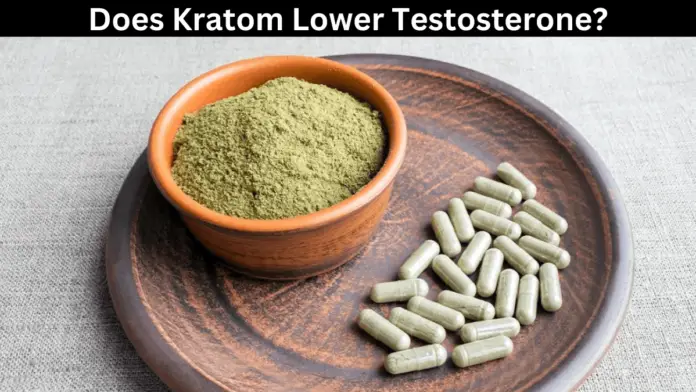
Kratom, a popular herbal supplement, has been the center of debate for its potential benefits and risks. Among the many concerns surrounding this plant, one that stands out is its impact on testosterone levels. The question “Does kratom lower testosterone?” has been a hot topic among users and researchers alike. In this comprehensive article, we’ll dive deep into the available evidence to help you understand whether kratom does indeed lower testosterone, along with the implications of its use.
What is Kratom?
Kratom (Mitragyna speciosa) is a tropical evergreen tree native to Southeast Asia. Its leaves contain two primary active compounds: mitragynine and 7-hydroxymitragynine. These compounds interact with opioid receptors in the brain to produce effects such as pain relief, relaxation, and euphoria. Kratom has been used traditionally for medicinal purposes, but its use in Western countries has increased in recent years as an alternative treatment for chronic pain, anxiety, and opioid withdrawal.
The Connection Between Kratom and Testosterone
To understand the link between kratom and testosterone, it’s essential to know how the compounds in kratom interact with the body. Mitragynine and 7-hydroxymitragynine, the primary active ingredients in kratom, bind to opioid receptors in the brain. This interaction is believed to be responsible for the plant’s analgesic (pain-relieving) properties.
However, opioid use has long been associated with hormonal imbalances, specifically lowered testosterone levels in men. This is because opioids can suppress the hypothalamic-pituitary-gonadal (HPG) axis, which regulates the production of sex hormones like testosterone. As a result, some individuals are concerned that kratom might also lead to decreased testosterone levels.
Read Also: Will a Vasectomy Lower Testosterone?
Studies on Kratom and Testosterone Levels
Research on kratom’s impact on testosterone levels is limited. One study in male rats found that daily administration of mitragynine for 30 days led to a significant decrease in testosterone levels. However, it’s important to note that animal studies do not always translate directly to humans.
In another study involving regular male kratom users in Malaysia, researchers found no significant difference in testosterone levels between kratom users and non-users. While this study provides some evidence against the claim that kratom lowers testosterone, it’s crucial to consider that factors such as dosage, frequency of use, and individual differences may influence the results.
Overall, the current research is not sufficient to draw a definitive conclusion about kratom’s effect on testosterone levels in humans. More well-designed studies are needed to better understand this relationship.
Factors That May Influence Kratom’s Effect on Testosterone
Several factors may influence whether kratom use leads to a decrease in testosterone levels. Some of these factors include:
- Dosage: Higher doses of kratom may have a more significant impact on testosterone levels than lower doses.
- Frequency of use: Frequent kratom use may be more likely to cause hormonal imbalances compared to occasional use.
- Individual differences: Genetic factors, overall health, and lifestyle choices may all play a role in how kratom affects an individual’s testosterone levels.
- Type of kratom: Different strains of kratom may have varying effects on hormone levels due to differences in their alkaloid content.
Potential Side Effects of Kratom Use
While the question “Does kratom lower testosterone?” remains inconclusive, it’s crucial to be aware of the potential side effects of kratom use. Some of these side effects include:
- Nausea and vomiting
- Constipation
- Dry mouth
- Loss of appetite
- Dizziness and drowsiness
- Increased heart rate
- Insomnia
- Dependency and addiction
- Liver damage (in rare cases)
It’s important to weigh the potential benefits of kratom use against the possible risks and side effects. Consult with a healthcare professional before using kratom, especially if you have pre-existing health conditions or are taking medications.
Read: Do Chia Seeds Lower Testosterone?
FAQs
Q: Does kratom lower testosterone?
A: The current research on kratom’s impact on testosterone levels is limited and inconclusive. While some studies suggest that kratom may decrease testosterone levels in animals, research on humans is insufficient to draw a definitive conclusion.
Q: How does kratom affect the body?
A: Kratom contains active compounds called mitragynine and 7-hydroxymitragynine, which bind to opioid receptors in the brain. This interaction can produce effects such as pain relief, relaxation, and euphoria.
Q: Are there any side effects of using kratom?
A: Kratom use can cause side effects such as nausea, constipation, dry mouth, loss of appetite, dizziness, drowsiness, increased heart rate, insomnia, dependency, addiction, and, in rare cases, liver damage.
Q: Is kratom legal?
A: The legality of kratom varies depending on the country and region. In the United States, kratom is legal at the federal level but banned in some states and cities. It’s essential to familiarize yourself with the local laws and regulations regarding kratom use in your area.
Q: How can I minimize the risks associated with kratom use?
A: To reduce the potential risks of kratom use, start with low doses and gradually increase if needed. Avoid using kratom frequently or combining it with other substances, and consult with a healthcare professional before using it, especially if you have pre-existing health conditions or are taking medications.
Conclusion
While the question “Does kratom lower testosterone?” remains unanswered due to limited research, it’s essential to be aware of the potential risks and side effects associated with kratom use. More well-designed studies are needed to better understand the relationship between kratom and testosterone levels in humans. In the meantime, exercise caution when using kratom and consult with a healthcare professional to determine if it’s a suitable option for you.












